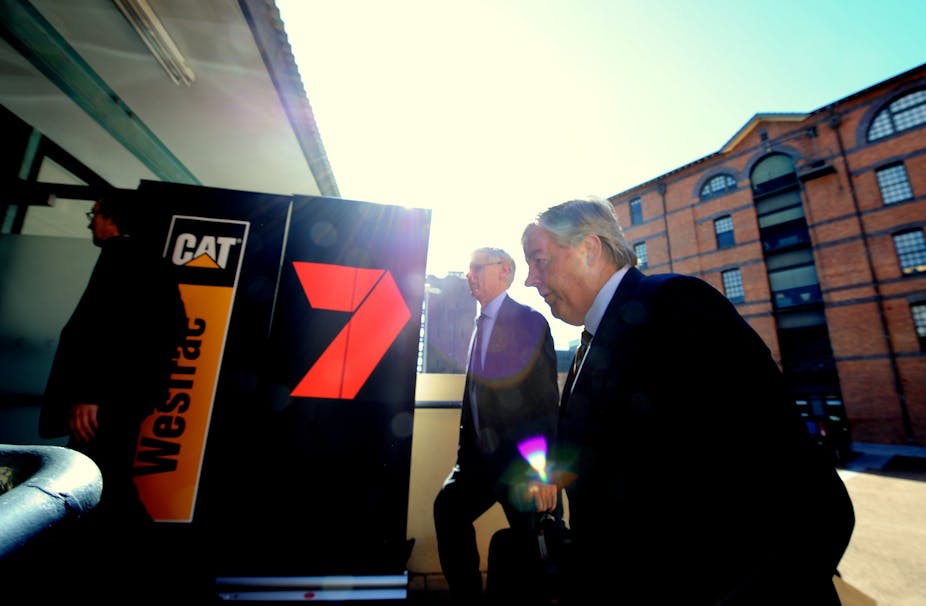When the report of the Independent Inquiry into the media and media regulation, aka Finkelstein inquiry, was released some time ago, it was denounced as sinister and – like the Leveson Inquiry in the UK – as a totalitarian assault on freedom of speech.
Some critics were quick to construe freedom of speech as freedom of the press, a sacred freedom that has been traditionally enjoyed by investors who own a press and have the money to hire a QC or two.
Finkelstein highlighted concerns regarding the Australian Press Council, an industry body that has no statutory basis or powers, is poorly resourced, does not cover the electronic media and historically has been loath to bite the corporate hands that feed it.
Those hands of course belong to a few commercial media organisations, consistent with the high level of media concentration in Australia. A realist might be forgiven for concluding that the most effective watchdog of journalistic behaviour – and managerial tolerance of misbehaviour – is the ABC’s Mediawatch program rather than the Council or Australian Communications and Media Authority (ACMA) that emphasises “light touch” self-regulation and has thus only ever imposed derisory penalties on errant commercial broadcasters.
Finkelstein (and associate Matthew Ricketson of the University of Canberra) was criticised for proposing a government-funded but independent national News Media Council, an entity with appropriate resourcing and power. Consistent with the “convergence” of media technologies and formats, the new body would be concerned with all media rather than in the words of former Prime Minister Paul Keating being restricted to the “princes of print”.
Critics indicated that regulation was best left to those who know what they are doing, that is, the managers and investors who control the media groups.
We might be forgiven - on reading the terse announcement from Seven West Media (the WA-based magazines and television network conglomerate) that it is abandoning the Press Council and going it alone to “guarantee accountability of all the group’s publications” – for asking whether moving house is a demonstration of improved accountability.
Seven West reportedly plans to set up an Independent Media Council headed by former judge, Christopher Steytler, a body which West Australian Newspapers group editor-in-chief Bob Cronin has said will be independent of the company and governments.
But this still raises questions about the Australian commercial media’s commitment to corporate social responsibility and best practice.
Will each media group set up its own Independent Media Council, each with a distinguished person at the head and each with no power? Can we trust the managers and investors to police themselves (a problematical notion given the global financial crisis) and respond effectively when concerns are raised?
Meanwhile the remaining members of the Press Council, apparently unfussed by Seven West’s secession, are proposing to double their funding of the Council. That’s admirable … and a small price to pay in avoiding establishment of a body that has sharp teeth.
Trust is a fundamental issue in an environment where billionaires such as Gina Rinehart and Solomon Lew reach for suppression orders to privatise justice, where some corporations and some colourful entrepreneurs have quite legally arranged their affairs to pay derisory amounts of tax (perhaps we need to adopt Norway’s publication of tax returns) and the dominant parties are reluctant to “speak truth to power”.
In an “information economy” power resides in the hands of people who control mines, broadcasters and newspapers and can afford the best QCs in town in litigation that keeps personal information out of the public domain. If we are to protect the Rineharts and Lews, what about the accident victims whose pain, as noted by Finkelsten, was exposed by by the broadcasters? What of figures such as David Campbell, “outed” by Seven Network staff and bereft of the comfort provided by a team of QCs queuing in the NSW Supreme Court for suppression orders?
From a regulatory perspective Seven West’s secession from the Press Council is disappointing - and possibly counterproductive to its aims.
A perceived flight from accountability is likely to reinforce calls for a national, whole-of-industry body that has teeth and is trusted. Trust is a foundation for courts heeding calls by the media not to privilege disputes involving the powerful through comprehensive suppression orders.
As Australia’s Chief Justice commented in a decision on the Rinehart dispute, “the proper conduct of trustees is a matter which warrants close public scrutiny”. That scrutiny is appropriate and imperative whether there is $500 million at stake, or $50. There are times when we should embrace notions of a freedom of the press that overrides concerns regarding privacy and confidentiality. Those notions however should not be taken as a given. They are founded on accountability.
In damning proposals for statutory protection against serious invasions of privacy (proposals recommended by law reform commissions in three Australian governments and thus presumably having some substance) the Rule of Law Institute last year proclaimed that:
Today, nearly 200 years after the first publication of the Australian newspaper, freedom of speech and freedom of the press remain under attack. This time the battle is the proposal of the Australian Government to pass a new law to make it illegal to talk or write the truth about another person where it “invades” that person’s privacy. …
… freedom of speech and freedom on the press are not limited to informing the public about matters of public concern. The Bill displays a fundamental misunderstanding of those freedoms and a desire to marginalise them.
Media groups that signal a disregard for accountability by becoming judge and jury arguably do as much to marginalise freedoms as any new statute. It’s time to embrace the Finkelstein Report.

